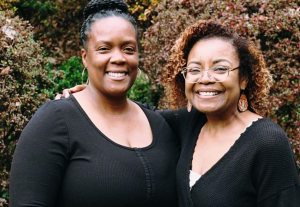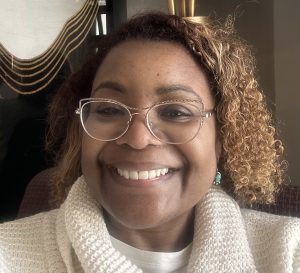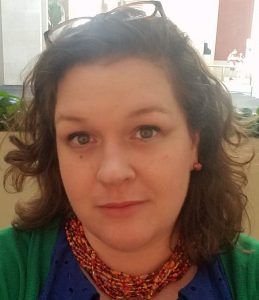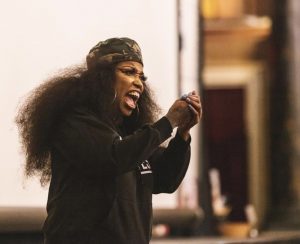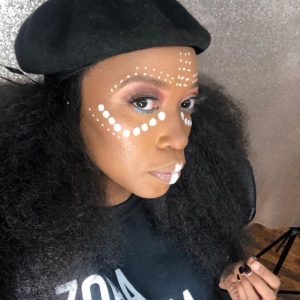
“She ain’t nothing but a $5 hoe,” our booknerd, stripper friend chides while she two-step shimmies towards the pole in the center of her new home’s private library. We are in her house, Young Money’s Seeing Green playing on repeat in the background. This is her den of delectable book treats. Surrounded by the smell of seductive stunken leather and crumpled paper backs, this is where she reads and entertains. “Like Sula,” our friend reinforces her statement with eyebrows raised as she grips the titanium-gold pole and wraps her legs around it, careful not to stab herself with her spiked four inch heel.
The $5 hoes that she is talking about are activists who partner with corporate brands for trinkets and the long-term effects those relationships have on communities. We are talking about how much modern day branding is like the physical branding done to ancestors of the past. Always some colonialist loser with their hot irons and pitchforks wanting to inflict their names and their labels and their pain on someone else’s chest or ass or thigh. And how branding cannot be misconstrued with reparation.
And she is changing the subject to Toni Morrison’s 1973 book, Sula, knowing damn well we have been drinking. We are sitting at our booknerd stripper friend’s meticulous and neat desk pontificating over an Old Fashioned in our ripped jeans and a bleached-brown-from-black Strategic AF tee shirt. We could use some lotion–and some socks. She is one with her pole.
“A $5 hoe like Sula?” our booknerd stripper friend pokes at Toni Morrison’s free-spirited protagonist and title character. In this deep character study of a novel, Morrison channels two best friends, Sula and Nell. Readers get to experience the two women’s lifetime of decisions on love, friendship, community, loyalty, and philosophy. We get to examine their dubious choices and more importantly examine our own through them–asking ourselves throughout the story, which character we are more like under different life circumstances. Sula or Nell?
Then our booknerd stripper friend effortlessly flips herself upside down, legs spread V to the sky. Talk about core strength.
Morrison has created an ongoing sore spot in our friendship.
We state:
“Sula was spontaneous.”
She states:
“Sula was inscrupulous.”
We state:
“Unscrupulous.”
She states:
“Bitch, you know what I mean.
She lands in a split that makes our cheeks ache.
We were asking her to imagine a world where Rosa Parks was sponsored by Aunt Jemima-selling syrup as she sauntered away from her seat in southern Alabama, where Fannie Lou Hamer was sponsored by Uncle Ben’s, pushing rice while delivering rants against racism at mass meetings in Mississippi. It is unimaginable.
“Don’t you dare say an unkind word about Ms. Parks,” she glances over her shoulder at us.
“What about Hamer?” Our hand gestures adamant towards the sky. “Morrison is speaking about the whole human,” our fingers like a maestro conducting our words. “We all a lil’ Sula from time to time. Not connecting our decisions to what is best for the community, not caring. We are all a lil’ Nell from time to time. Over sacrificing at our own peril. No need to choose between these two. Instead stand in the middle.” We rest our flailing arms at our sides.
Modern day branding tactics are sneaky and not nearly as visceral as cooking someone’s flesh with a burning hot piece of metal. Because of this, the tactics are a little harder to spot. They may disguise themselves in marketing lingo like partnership, campaign, and collaboration or hide behind financial backing calling themselves grants, fellowships, and awards knowing damn well they have an ulterior motive—let us put our names on your back, shoulder, or face like chattel.
“We had a woman reach out wanting to present a youth poetry award at the bookshop,” we say looking through our friend’s super neat Nicki Minaj cover collection.
“Sweet,” she is on the floor stretching. “You should stretch your hip,” she says tapping the floor where she wants us to sit down next to her.
“Right. No problem. Sure.” We ignore her and get back to our story. “But the closer we got to the event, the youth poetry award woman finally shared that the award was being sponsored by Gucci and that they wanted to pay us for using our venue as long as one of their representatives was able to present the award and speak to the press out front. But Gucci had literally just dropped their Blackface turtleneck line. We were like, ‘Sis, we could never host them after that.’ And the crazy thing is she couldn’t understand why not. They’d just given her a community ambassador fellowship, she said clutching her pearls. Five thousand dollars and that turtleneck thing was a thing of the past. So is slavery,” we rolled our eyes as she and her little check pranced out the door.
“Precisely. In my industry, the best of us live by a standard. We work by a code. We have to have each other’s backs. But there are those who don’t.” Our booknerd stripper friend is laid flat out on her back taking in deep breaths. “We say this is a hoe willing to mess it up for everyone else by accepting $5 to do some shit that the rest of us would never do at all because it doesn’t serve anyone—it doesn’t even serve the hoe. We chop those dumb bitches the fuck up at the end of the night because they make it harder for the rest of us having people think we are all $5 hoes,” she Floyd Mayweather jabs and uppercuts the air.
At this point, some of us may ask ourselves, why would anyone accept less than they deserve? And the answer is because we don’t know what we deserve and haven’t asked ourselves this question enough for actual feedback.
We stay quiet. We know very little about booknerd stripper culture. The closest we’ve come in support of our friend’s self-proclaimed, good hoe goals is cornrowing her braids into a crown that fit snugly beneath her platinum 40 inch.
“What about freedom, though?” we ask after a long minute of silence. “Aren’t people allowed to do whatever they want? Free will?”
“Yup, and those free hoes who do so without a standard among people who they can trust are easy prey. They always get picked off. Those people, like Sula, end up chopped and alone with people like me and Nell who have to come along and give them medicine and pick up their pieces.”
In Morrison’s novel, Nell ends up serving her lifelong friend, Sula, in her dying moments, even after what she perceives is Sula’s severe betrayal.
“What we always felt was missing from Sula and Nell’s relationship was a plan. A decision. A meeting of the minds,” we say looking down into our glass of Old Fashioned.
“Yup and the moral of the story is never be a $5 hoe, my G,” she says dozing off to sleep.
Ase. And so shall it be.
For the last 10 years, Jeannine Cook has worked as a trusted writer for several startups, corporations, non-profits, and influencers. In addition to a holding a master’s degree from The University of the Arts, Jeannine is a Leeway Art & Transformation Grantee and a winner of the South Philly Review Difference Maker Award. Jeannine’s work has been recognized by several news outlets including Vogue Magazine, INC, MSNBC, The Strategist, and the Washington Post. She recently returned from Nairobi, Kenya facilitating social justice creative writing with youth from 15 countries around the world. She writes about the complex intersections of motherhood, activism, and community. Her pieces are featured in several publications including the Philadelphia Inquirer, Root Quarterly, Printworks, and midnight & indigo. She is the proud new owner of Harriett’s Bookshop in the Fishtown section of Philadelphia.
